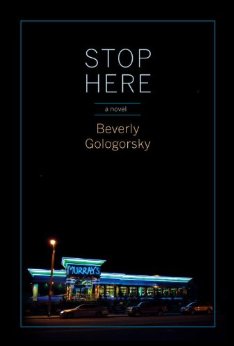 Beverly Gologorsky’s kaleidoscopic and complex second novel introduces four diverse women—Ava, Dina, Mila, and Rosalyn—and the working-class, suburban Long Island community in which they live. The many people with whom they interact—bosses, co-workers, children, lovers, parents, and mates—come and go throughout the book, but it is the women’s ironclad friendship that keeps them grounded and sane.
Beverly Gologorsky’s kaleidoscopic and complex second novel introduces four diverse women—Ava, Dina, Mila, and Rosalyn—and the working-class, suburban Long Island community in which they live. The many people with whom they interact—bosses, co-workers, children, lovers, parents, and mates—come and go throughout the book, but it is the women’s ironclad friendship that keeps them grounded and sane.
Three of the four work as wait staff at Murray’s Diner and have served the same clientele for years, developing superficial but fond relationships with their customers. In fact, a caring community—think Cheers—has evolved as the women fret over this one’s absence or that one’s changed demeanor. It’s lovely.
At the same time, each character faces snares and obstacles. Ava, for example, continues to grieve for her husband, killed years earlier in the first Iraq war. The others have different struggles. Rosalyn has breast cancer; Dina’s son is on the run, trying to evade capture after committing an undisclosed crime; and Mila’s daughter Darla is hell-bent on enlisting in the military. That Darla is refusing to listen to her mother’s entreaties about danger, instead focusing on the benefits promised by a charismatic recruiter, is driving Mila mad, but at age 18, the child no longer needs her single mother’s consent to sign up.
Anger, tension, confusion, angst, exhaustion, terror—it’s all here as the women try to maintain their tenuous grip on The American Dream. Their lives are complicated and while they interact with a huge coterie of ancillary characters—I literally had to make a chart to keep everyone straight—Gologorsky presents their everyday conundrums with enormous compassion.
As bottles of wine are uncorked, the four friends share their innermost thoughts and dreams. And over the book’s several-year time span, there is much to chew over. There are new relationships, betrayals, affairs, unplanned pregnancies, deaths, and concerns about both childrearing and elderly parents. In addition, each of the women interacts with at least one wounded warrior, men so damaged by combat that there is little a loving family member or friend can do to restore them to self-sufficiency.
Gologorsky’s eye is laser-sharp and as the novel’s many strands unfold, she offers more than a few revelations about the aftermath of war and the pushes-and-pulls inherent in heterosexual unions. Take Rosalyn’s observation that “men want women to need them so they can feel strong and noble, but when women do lean on them, men feel suffocated.â€
There is no question that the women depicted in “Stop Here” want men in their lives, but it is equally clear that they’re fine alone. It’s a staggeringly real depiction. Indeed, Gologorsky has written a grown-up story about people who are grappling with potent, adult issues. Relationships are neither demonized nor idealized and people do not always behave well. But in zooming in on one small circle, she subtlety gets to the heart of gender disparity and social class in the United States of America.
Similarly, the burdens of serving others—as a soldier, in the service industry, or as a wife, girlfriend, or daughter—are presented without rancor and Gologorsky shines a rare floodlight on the realities of being a wage-earning female. What’s more, with ongoing war as the backdrop, “Stop Here” makes the political personal. In so doing, the lives of typically-unheralded women are acknowledged and valorized.
“Stop Here,” by Beverly Gologorsky, Seven Stories Press, 240 pages, $16.95. Release date: November 19, 2013.

Leave a Reply